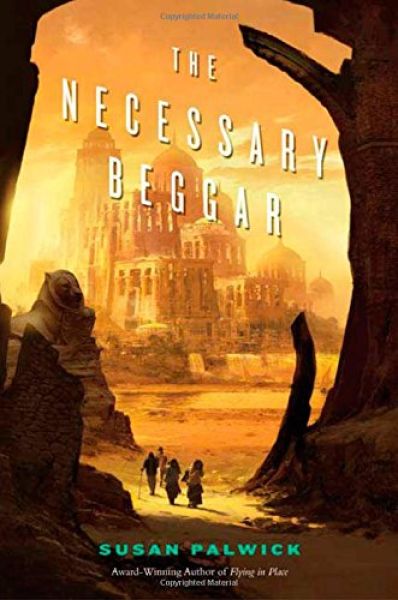Learn from my mistake
The Necessary Beggar
By Susan Palwick

4 Jul, 2015
0 comments
While she had been actively publishing at shorter lengths, Susan Palwick’s 2005 book The Necessary Beggar ended a thirteen year novel publication drought, a return to longer form her fans certainly appreciated. Inexplicably, despite counting myself among those fans, this is the first time I have ever read this novel [1]. Having finally read it, I regret having delayed gratification so long.
No one in Lémabantunk knows why Darroti murdered Mendicant Gallicina; Darroti won’t explain and of course Gallicina cannot. Darroti’s punishment is the harshest the city can exact: exile through a one-way gateway to another universe, to an alien nation calling itself America.
Darroti’s entire family is exiled along with him. He could have saved them from exile into an unknown world if he had had the fortitude to kill himself. Though he was tempted, he found suicide beyond him. Or at least it was impossible until he and his relatives found themselves consigned to an American refugee camp deep in an American desert.
Unfortunately for his family, not only does Darroti’s belated act of self-destruction leave them grief-stricken but it comes too late to save them. They are still trapped for the rest of their lives in a foreign land. The United States of the early 21st Century is in no way inclined to welcome strangers. The best the refugees can expect is to be crammed into isolated camps and tended to by well-meaning but powerless allies. The worst? A violent death at the hands of nativist extremists.
Escape requires luck and an embrace of criminality. Having purchased new identities, Darroti’s extended family — father Timbor, sister Zamatryna, brother Macsofo and the others — have to adapt to a society unlike theirs, one technologically advanced but largely innocent of the charitable virtues treasured in Lémabantunk. Moreover, the fundamental rules governing the supernatural appear to be different in this universe. Zamatryna adapts by abandoning her old identity, Macsofo by adopting the worst of his brother’s flaws. Years pass and possible exposure as criminals looms. All due to a terrible crime which remains inexplicable. The explanation seemingly lies in another universe, now forever beyond their reach.
~oOo~
Palwick fans can spend enjoyable hours arguing about whether her earlier Flying in Place is fantasy or a mundane novel about a deluded girl. The Necessary Beggar is unquestionably fantasy, a portal fantasy. Usually the portal takes one to a fantasy realm; Palwick opts for the uncommon option of a portal from a fantasy realm into a seemingly mundane United States of America. Portal fantasies are for some reason considered passé these days; I am not sure why.
Palwick’s immigrants aren’t glorious explorers of a strange new world like the kids in Narnia or a lone wolf fleeing in hope of a better life like the fellow in Witch World. Palwick’s model is somewhat different: the unwilling immigrants driven out of their home en masse, forced to emigrate to an unfamiliar nation. For them, America is not the promised land, merely the land of exile. They may have been transported safely, but otherwise they have a lot in common with the refugees drowning in the Mediterranean.
Palwick’s version of 2020s America is not a nice place. The charitable are powerless to provide much beyond palliative help to those trapped in the camps, The malign manage to run up impressive body counts. The exiles from Lémabantunk are worse off than many other refugees, as they have no identity papers and come from a universe of which the US has no knowledge. Their situation is extreme but it is in no way unique.
(To be honest, I am not sure why Palwick set this in the future. It’s not like the US treated undocumented immigrants particularly well back in the early ’00s when this was written, and the US, like most other nations, has had episodes of ethnic cleansing, against indigenes, Mexicans, Chinese, Japanese and so on, periods when looking like a certain sort of person would have been ill advised.)
Despite its flaws, the US of this novel isn’t a horrible dystopia; the uncharitable appear to have the power to persecute and oppress, but that does not mean that there aren’t Americans who will do anything they can, despite cost and risk, to help strangers in need. For that matter, differences between the two universes, differences in the powers available to those with supernatural abilities, suggest a possible solution for their problems that would be impossible at home.
The exile’s homeworld is not exactly a utopia either. It’s a socially stratified society that exiles an entire family for the crimes of one member. Crimes that the reader will discover were not at all what the authorities thought they were. Lémabantunk is not perfect, it’s just different in ways that may appeal to some readers.
Having only read Palwick at novel length, I have an incomplete knowledge of her work. I suspect that someone more familiar with her fiction would not have been as surprised as I was to be reminded of the work of the late Zenna Henderson. There are many parallels between Henderson’s People (kindly refugees from another planet) and Darroti’s family (kindly refugees from another universe). While it’s possible that Palwick was inspired to some degree by Henderson, I suspect that they independently decided to write stories about exiles in America, and approached their stories with beliefs about the necessity of kindness and the ultimate power of empathy.
Having read this, I regret putting off reading it for as long as I did. I suggest you not repeat my error. The Necessary Beggar is available from Tor.
1: I was supposed to read it for a panel at Farthing, a con Jo Walton ran in Montreal for some years. I … brought the wrong book.
